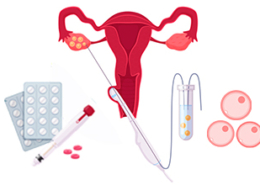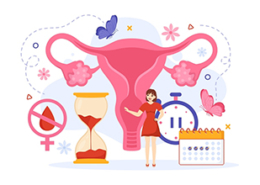How can you improve your uterine health and increase your chances of getting pregnant?
As one of the most important parts of a woman’s reproductive system, the uterus plays a vital role in fertility and giving birth to a healthy baby. The well-being of this organ not only aids in embryo implantation but also plays a crucial role in the growth and development of the fetus. Uterine problems such as fibroids, endometriosis, or polyps can either decrease the chance of becoming pregnant or increase the risk of miscarriage, premature labour, and other pregnancy complications.
Various factors influence the health of the uterus, including nutrition, lifestyle choices, hormonal balance, psychological well-being, and the presence of inflammatory or infectious diseases. Chronic stress and environmental pollution can also impair the function of this vital organ and decrease fertility chances.
Understanding uterine strengthening strategies for pregnancy is essential not only for women who are on the path to having children but also for all women who care about their health. In this article, we will examine the importance of healthy uterine function and provide effective strategies to promote its health.
The Role of the Uterus in Fertility
The uterus is a pear-shaped organ located in the pelvis, situated between the bladder and the rectum. It plays a crucial role in both the menstrual cycle and pregnancy. If fertilization takes place between an egg and a sperm, the fertilized egg, known as a blastocyst, implants itself in the inner wall of the uterus, called the endometrium, and begins to develop. At this moment, pregnancy officially begins, and the uterus gradually enlarges to accommodate the growing fetus.
Maintaining pregnancy and supporting foetal development depends on the health of the endometrium and adequate blood flow to the uterus. Good blood circulation facilitates the effective delivery of nutrients and oxygen to the uterus, ensuring its normal functioning. Additionally, optimal conditions for pregnancy occur when the endometrium is neither too thin nor too thick. By maintaining this balance, the fetus is able to attach well to the uterine wall and receive the necessary nutrients for proper development.
Common Uterine Conditions That Affect Fertility
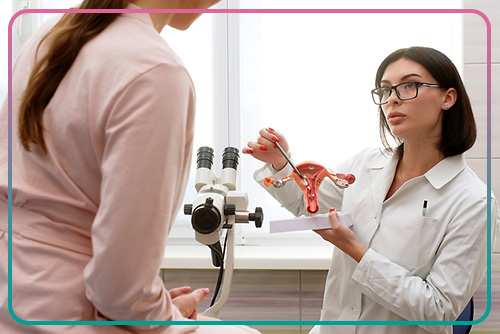
Certain conditions can impact the health and function of the uterus, which may reduce the chances of a successful pregnancy. The most common uterine conditions include:
- Uterine Fibroids: These are small, noncancerous tumours that develop in the uterus during a woman’s reproductive years. Uterine fibroids can sometimes lead to symptoms such as heavy menstrual bleeding, pelvic pain, or issues with infertility. However, many women with fibroids do not experience any symptoms and may be unaware of their presence.
- Uterine Polyps: These are growths that occur due to an overgrowth of endometrial cells, which are the tissue that lines the uterus. Uterine polyps can lead to symptoms such as heavy menstrual bleeding, abnormal vaginal bleeding, or issues related to fertility.
- Endometriosis: This is a painful condition in which tissue similar to the endometrium grows outside the uterus, affecting surrounding organs like the Fallopian tubes and ovaries. Common symptoms of endometriosis include pelvic pain, painful menstruation, discomfort during sex, infertility, abnormal bleeding, and digestive issues such as constipation or diarrhoea during menstrual periods. learn more about endometriosis and its effects on fertility: Endometriosis and Its Impact on Fertility
- Adenomyosis: This is a uterine condition where the endometrial lining (the inner lining of the uterus) grows into the muscular wall of the uterus. This can lead to symptoms such as pain, heavy bleeding, and infertility.
- Asherman’s Syndrome: This condition is characterized by the formation of scar tissue within the uterus, which can reduce the internal space available for a developing foetus.
- Endometrial Thinness: An excessively thin endometrial lining can make it difficult for an embryo to implant, leading to fertility issues.
- Infectious diseases: Infection may disrupt the normal functioning of the uterus and other reproductive organs by destroying cells.
Why is uterine preparation necessary before IVF or natural conception?
Uterine preparation is crucial for the success of both natural conception and in vitro fertilization (IVF). During a natural pregnancy, hormones like oestrogen and progesterone work together to prepare the uterine lining for embryo implantation. If the balance or function of these hormones is disrupted, it can reduce the chances of implantation and increase the risk of miscarriage.
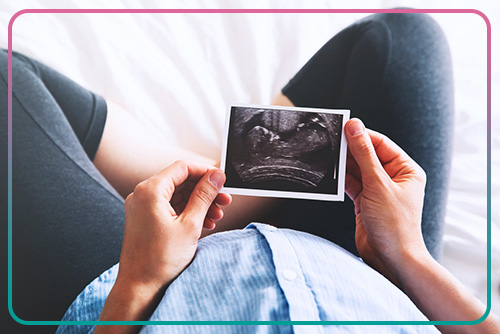
In IVF, hormonal medications are used to prepare the uterus. However, unhealthy lifestyle choices, such as poor nutrition, lack of exercise, and high levels of stress, can diminish the effectiveness of these medications and lower the chances of successful treatment and pregnancy. Therefore, it is essential to follow medical advice and make lifestyle modifications alongside drug treatment to enhance the likelihood of success in IVF procedures. Learn more about tips to increase the success in IVF procedures: How To Increase Your Chance Of A Successful IVF Cycle
Signs and Symptoms of Uterine Problems
Uterine problems can present a variety of symptoms. The most common ones include:
- Irregular menstruation
- Heavy or prolonged menstrual bleeding
- Spotting between menstrual cycles
- Pelvic pain
- Abnormal vaginal discharge
- Pain during urination
- Recurrent miscarriages
- Infertility
- History of IVF failure
If you experience any of these symptoms, it is advisable to consult a gynaecologist.
The Importance of Early Diagnosis of Uterine Diseases
Uterine diseases can significantly impact women’s health, potentially leading to issues such as infertility, recurrent miscarriages, abnormal bleeding, and chronic pain. Therefore, early diagnosis is particularly crucial for women of reproductive age. Treating these conditions in their initial stages is often simpler, more effective, and less expensive. However, if these diseases are not diagnosed and addressed promptly, they can progress, resulting in the need for more complex and costly treatments.
The Role of Nutrition in Strengthening the Uterus for Pregnancy

Proper nutrition is a key factor in preparing the uterus for pregnancy. A healthy diet can help improve uterine function and increase the chances of fertility.
Fertility-Boosting Foods
Consuming the following foods helps regulate hormones and maintain the health of the reproductive organs, especially the uterus:
- Berries: Blueberries, strawberries, and other berries are rich in antioxidants that protect reproductive tissues from oxidative stress, which can damage cells in the body.
- Avocados: The unsaturated fats in avocados help regulate sex hormones.
- Leafy greens: The iron and folate (vitamin B9) found in spinach, parsley, cilantro, and other leafy greens increase blood flow to the uterus and also play an important role in preventing anaemia.
- Beets: This food is rich in antioxidants, strengthens the immune system, and protects uterine cells from free radicals.
- Whole grains: Whole grain bread, oats, and quinoa are all rich in fiber and important nutrients that help maintain hormone balance.
- Nuts: Almonds, hazelnuts, walnuts, and pistachios are rich in antioxidants and omega-3 fatty acids. Hence, their regular consumption helps improve egg quality, regulate hormones, and promote uterine health.
- Fish: This food is a good source of omega-3, helps regulate sex hormones, and reduces inflammation in the uterus.
Foods to Limit.
In addition to the beneficial foods that support uterine health, certain foods can disrupt hormonal balance and negatively affect the functioning of this important organ. These foods include:
- Sweet snacks and drinks: High sugar intake can cause changes in uterine cells and increase the risk of endometriosis and uterine cancer.
- Trans fats: This type of fat, found in fried foods, cakes, biscuits, and margarine, can disrupt the balance of sex hormones and increase inflammation of uterine tissue.
- Red meat and processed meats: High consumption of red meat is associated with the growth of fibroids in the uterus. Processed meats such as sausages can also aggravate uterine problems due to their preservatives and additives.
- Processed foods: The sugar, salt, and other additives in these foods cause systemic inflammation, oxidative stress, and hormonal disruption. As a result, they affect egg quality and uterine health and reduce the chances of pregnancy.
- Caffeine: Excessive caffeine consumption may lead to serious problems such as anxiety and hormonal imbalance.
Key Nutrients and Supplements for Uterine Health
Research shows that vitamin D can help shrink uterine fibroids. Some nutrients, including folate, vitamin B12, vitamin C, vitamin E, iron, zinc, omega-3 fatty acids, and coenzyme Q10, play critical roles in regulating hormone production, effectively transporting oxygen to uterine tissue, supporting healthy cell division in the reproductive system, and promoting proper endometrial growth.
Most women can obtain essential nutrients through a varied and balanced diet. However, some individuals may require supplements due to reasons like vegetarianism or specific medical conditions. In such cases, it is advisable to consult a doctor or a nutritionist to determine the appropriate supplement. Learn more about supplements for boosting women’s fertility: What are the best supplements for female fertility?
The role of hydration and digestive health in fertility
Staying properly hydrated and maintaining a healthy digestive system significantly impacts fertility. Dehydration can disrupt your menstrual cycle and make it difficult to ovulate. Additionally, drinking enough water helps flush out toxins, which can improve uterine health and enhance egg quality. Proper functioning of the digestive system, especially the intestines, is crucial for the absorption of vitamins and minerals. These nutrients are essential for ovulation, embryo implantation, and maintaining a healthy pregnancy.
Lifestyle and natural solutions to improve uterine health

-
Exercise and physical activity
Light activities such as yoga, swimming, cycling, walking, and stretching help strengthen the uterus for pregnancy. They increase the secretion of endorphins, reduce stress, improve mood, and prevent menstrual disorders. On the other hand, they improve blood circulation in the uterus and ovaries and facilitate the process of ovulation and implantation of the embryo by regulating hormones.
-
Weight Management
Obesity disrupts the balance of sex hormones, interferes with ovulation, and causes menstrual irregularities. All of these factors reduce the chances of a successful pregnancy and increase the risk of miscarriage and pregnancy complications.
In addition, obesity is associated with insulin resistance, which causes excess production of androgens (male hormones) and disrupts the ovulation process. It can also reduce the chances of success of assisted reproductive techniques such as IVF.
-
Stress Management
High levels of cortisol (the stress hormone) can suppress sex hormones, cause irregular periods or stop ovulation, affect egg quality and uterine health, and reduce the chances of getting pregnant. Meditation, yoga, deep breathing, and other relaxation techniques help reduce stress and balance cortisol levels, and they help increase blood flow to the reproductive organs.
-
Avoid Environmental Toxins
Smoking, alcohol consumption, and exposure to environmental toxins, particularly pesticides, can greatly impact uterine health. These substances can disrupt the menstrual cycle and contribute to uterine conditions such as endometriosis or fibroids. Additionally, they may cause inflammation and oxidative stress in uterine tissue, which increases the risk of miscarriage and birth defects.
Medical support to maintain uterine health
Medical consultation and examinations play an important role in maintaining uterine health. Regular check-ups and specialized care can prevent uterine problems and increase readiness for pregnancy.
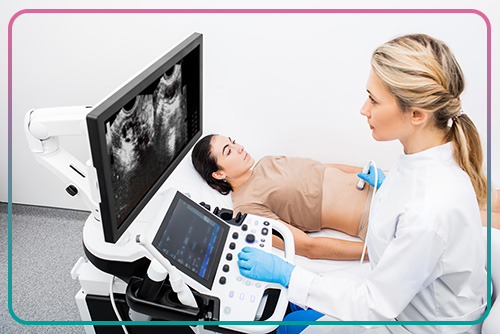
Common Diagnostic Tools for Uterine Problems
Doctors utilize various methods to diagnose issues related to the uterus, including:
-
Pelvic Exam
During a pelvic exam, the doctor checks the reproductive organs, such as the uterus, cervix, ovaries, and vagina, for any abnormalities or signs of inflammation. This exam typically involves the use of an ultrasound.
-
Uterine Ultrasound
This procedure can be performed in two ways: abdominal and transvaginal. The transvaginal ultrasound provides a more accurate assessment of the uterus.
-
Hysteroscopy
Hysteroscopy is a minimally invasive procedure used to examine and, if necessary, treat problems within the uterus. A thin tube with a camera is inserted through the vagina into the uterus, allowing images to be transmitted to a monitor. This procedure can be used to diagnose conditions such as polyps, fibroids, adhesions, and other uterine abnormalities, and it is usually performed with minimal discomfort and without the need for surgery. learn more about hysteroscopy for uterus examination and treatment: Hysteroscopy procedure: Preparation and recovery
-
Sono-Hysterogram
This is a type of ultrasound that involves injecting a saline solution into the uterus. It provides detailed images of the uterine wall, cavity, and fallopian tubes.
-
MRI
An MRI is an advanced imaging technique that produces detailed pictures of the uterus and other pelvic organs. It is helpful for accurately diagnosing uterine diseases.
Common Treatments for Uterine Conditions
Treatment for uterine issues varies based on the underlying cause, the severity of the condition, and the patient’s overall health. Here are some common treatment options: – Hormonal Treatments: Many uterine disorders, such as endometriosis, can be managed or treated with hormonal medications. These may include birth control pills or other hormone-regulating drugs.
-
Removal of Fibroids or Polyps
If fibroids or polyps are causing significant symptoms or contributing to infertility, a hysteroscopy may be recommended to remove them and alleviate uterine problems.
-
PRP Injections
Injecting platelet-rich plasma (PRP) into the uterus can help increase the thickness of the endometrium, which may improve the chances of embryo implantation and successful pregnancy.
-
Antibiotics
Uterine infections are typically treated with antibiotics. It is important to complete the prescribed course of antibiotics to prevent the infection from recurring.
In many cases, particularly in advanced stages of the disease or when a single method is ineffective, a combination of the aforementioned methods is employed.
Uterine Preparation Strategies Before IVF
In vitro fertilization (IVF) is an advanced assisted reproductive technology where eggs are extracted from a woman’s body and combined with sperm in a laboratory setting. Once the embryo forms and develops, it is transferred to the uterus. Proper uterine preparation is crucial to enhance the chances of success with this procedure. Some effective strategies for uterine preparation include:
-
Endometrial Scraping
During this procedure, the doctor uses a specialized tool to scrape the surface of the uterine wall. This stimulates the process of endometrial repair and growth, enhancing the likelihood of successful embryo implantation.
-
Hysteroscopic Cleaning
In some cases, a doctor may recommend hysteroscopy before embryo transfer. This procedure cleans and prepares the uterus for the transfer more effectively.

-
PRP Injection to Strengthen the Endometrium
The use of platelet-rich plasma (PRP) is a newer method aimed at improving uterine conditions during IVF cycles. By injecting PRP into the uterus, the endometrium can thicken, creating a more favourable environment for embryo implantation. This technique can significantly increase the chances of successful IVF, especially for patients with a thin endometrium or those who have experienced repeated failures.
-
Improving Nutrition Before Embryo Transfer
Following a diet rich in vitamins, minerals, and antioxidants can strengthen the inner lining of the uterus and further enhance the chances of successful implantation. By implementing these strategies, individuals undergoing IVF can improve their chances of achieving a successful pregnancy. learn more about foods and diet before IVF: The Best Diet For IVF: What To Eat When Trying to Conceive
How to prepare the uterus for pregnancy
Preparing the uterus involves several basic steps, the observance of which can significantly increase the likelihood of a successful pregnancy:
- Examination and consultation with a gynaecologist: Regular examination and evaluation by a gynaecologist plays a key role in maintaining the health of the uterus and its readiness for pregnancy. These consultations help to identify possible problems promptly, examine the condition of the endometrium, and provide accurate medical recommendations to improve fertility.
- Increasing the receptivity of the endometrium for implantation: Treating uterine problems, doing light exercise, and following a healthy diet help improve the thickness and quality of the inner wall of the uterus.
- Caring for the uterus after a miscarriage: Getting enough rest, avoiding sex for about 2 weeks, eating healthy foods, especially foods rich in iron, and drinking plenty of fluids will speed up the process of uterine repair. It is also essential to receive psychological support from your spouse and other relatives to increase the body’s readiness for pregnancy again.
Frequently Asked Questions
Can uterine health be improved naturally?
Yes. A healthy and varied diet, light exercise, stress management, avoidance of environmental toxins, and a generally healthy lifestyle play an important role in strengthening the uterus for pregnancy.
How does diet affect uterine health?
Foods containing folate, vitamin D, iron, omega-3, and other nutrients help regulate hormones, improve uterine wall thickness, and enhance uterine blood flow.
Is it always necessary to remove fibroids before IVF?
No. The decision to do this depends on the size, location, and number of fibroids. Large or multiple fibroids usually need to be removed from the uterus before IVF.
How long before embryo transfer should I spend preparing my uterus?
Most women are advised to modify their lifestyle three to six months before starting IVF. A healthy lifestyle is a key factor in improving the condition of the uterus before pregnancy.
What are the signs of a healthy uterus?
Regular menstruation, normal vaginal discharge (clear or milky), and no severe pain or abnormal problems during menstruation are the most important signs of a healthy uterus.
What are the risks to fertility if uterine diseases are not treated?
These diseases increase the risk of infertility, miscarriage, and pregnancy complications. Some uterine diseases also cause abnormal, heavy bleeding and pain during menstruation.
Conclusion
A healthy uterus not only increases the chances of pregnancy but also provides a suitable environment for the growth and development of the fetus. Therefore, getting to know the strategies for strengthening the uterus for pregnancy is an effective step on the path to having children. Following a diet rich in essential nutrients, along with avoiding harmful foods, can have a significant impact on uterine function. Stress management, regular physical activity, and quitting alcohol and smoking also play an essential role in improving uterine health and increasing fertility. However, if you have not been able to conceive despite following a healthy lifestyle, do not lose hope. Today, medical science has made it possible for many women to experience the sweet taste of motherhood. If you are thinking about IVF or infertility treatment and are looking for an experienced and reliable doctor, contact us to benefit from affordable packages, professional advice, and compassionate care in Iran.

However, if you have not been able to conceive despite following a healthy lifestyle, do not lose hope. Today, medical science has made it possible for many women to experience the sweet taste of motherhood. If you are thinking about IVF or infertility treatment and are looking for an experienced and reliable doctor, contact us to benefit from affordable packages, professional advice, and compassionate care in Iran.
We have also worked closely with the best gynaecologists and IVF specialists in Iran to provide a wide range of treatment services for uterine problems. These services include hysteroscopy, laparoscopy, hormonal treatments, PRP injections into the uterus, and other new and effective methods for treating uterine diseases.
By taking advantage of up-to-date knowledge, advanced equipment, and affordable costs in Iran, you can confidently begin your treatment process and take an effective step towards improving uterine health and increasing your chances of fertility.
References:
What tests diagnose conditions of the uterus?
Foods for Healthy Ovaries and Uterus

